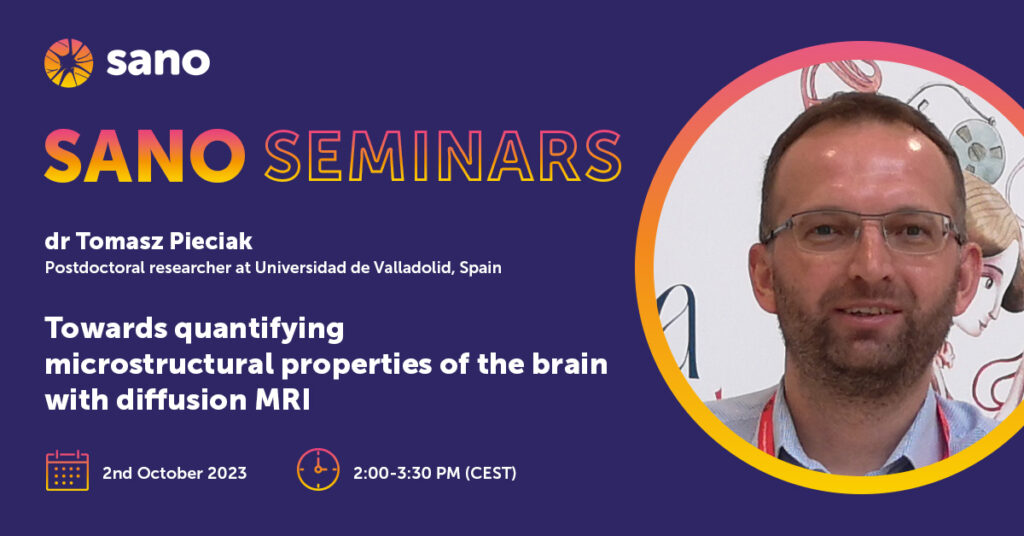106. Towards quantifying microstructural properties of the brain with diffusion MRI
dr Tomasz Pieciak – Postdoctoral researcher at Universidad de Valladolid, Spain
Abstract
Unlike standard magnetic resonance imaging (MRI), such as the T1- or T2-weighted, which primarily evaluates the brain qualitatively, the diffusion MRI technique inspects brain tissue quantitatively by probing the diffusion of water molecules in vivo. Diffusion MRI technique has great potential in clinical and research scenarios, including measuring microstructural features of the human brain, characterization of vascular conditions, grading intracranial tumours, or studying neurodegenerative diseases and psychiatric disorders. However, the diffusion MRI technique requires the raw data the scanner provides to be adequately processed and represented using advanced and complex mathematical models. Once the quantifiable measures from the data are derived, the radiologist or scientist can start inspecting the microscopic tissue configuration and structural connectivity of the brain. This lecture presents the elemental diffusion MRI techniques, such as diffusion tensor imaging, but it also goes beyond the Gaussian-like diffusion by introducing more advanced quantitative measures, including propagator-based measures or signal representations that depict both diffusion and relaxation properties. Eventually, some recent advances in brain ageing uncovered with diffusion MRI and relevant questions when applying the artificial intelligence-based methods to diffusion MRI data will be demystified.
About the author
Dr. Tomasz Pieciak is a postdoctoral researcher at Universidad de Valladolid, Spain. His research focuses on signal and noise modelling in magnetic resonance imaging (MRI), data reconstruction algorithms, diffusion MRI, diffusion relaxometry MRI and deep learning in medical imaging. He is the recipient of numerous awards and distinctions, including Siemens Promotional Award for the best doctoral thesis in engineering sciences (Warsaw, 2018), the Award of the Polish Image Processing Society for the best doctoral dissertation in the field of “theory and applications in the field of computer systems for processing, analysis and interpretation of images and scenes (…)” (Warsaw, 2018), a Stipend for outstanding young researches under 35 granted by the Ministry of Science and Higher Education (Warsaw, 2018), the ABB Research Center distinction in the competition for the best research work in technical sciences (Kraków, 2019), a Bekker Prize awarded by the Polish National Agency for Academic Exchange (Warsaw, 2020), the winner of the MRI White Matter Reconstruction (MEMENTO) Challenge (subchallenge #1) (Iowa City, 2020), the recipient of the “Best Presentation Award” for the work on the free-water volume fraction of the brain across the adult lifespan at the ISMRM Iberian Chapter Annual Meeting (Lisbon, 2022). In 2022, the Minister of Education and Science honoured him with a departmental distinction for “outstanding contribution to education and upbringing”. The MICCAI’23 put him on the list of the conference’s best reviewers (honourable mention) out of 1,659 experts from around the world.


